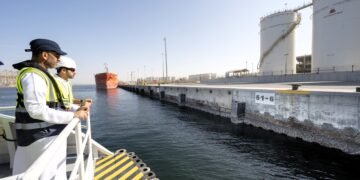The Gulf’s Trillion-Dollar AI Dream Has a Water Problem
Tech giants are pouring oil riches into Middle East data centers as water scarcity threatens digital ambitions.
The Gulf’s multitrillion-dollar push to dominate the artificial intelligence (AI) era is colliding with a region-defining constraint: water scarcity.
As Saudi Arabia and the United Arab Emirates (UAE) accelerate efforts to become AI superpowers, they are courting global tech titans such as OpenAI, Google, Microsoft, and Amazon Web Services. But behind the glamour of data-driven innovation lies an intensifying environmental challenge. The data centers powering AI are ravenous consumers of water for cooling, and projections suggest they will devour more than 426 billion liters annually by 2030.
That figure represents a staggering leap from just 119 billion liters in 2025, according to Mordor Intelligence. In a region where water scarcity is chronic and growing, that level of consumption could imperil not only environmental sustainability but also the Gulf’s AI ambitions themselves.
The World Resources Institute ranks countries like the UAE, Saudi Arabia, and Qatar among the most water-stressed nations globally. Per capita water use exceeds 500 liters per day, dwarfing the European average. Despite the pressures, these nations have doubled down on future-facing investments. During President Donald Trump’s Middle East tour in May, leaders inked $2 trillion worth of tech and infrastructure deals.
Among the high-profile developments is the upcoming Stargate AI campus in Abu Dhabi, a 1-gigawatt megaproject backed by OpenAI and local AI powerhouse G42. Saudi Arabia, meanwhile, is targeting 2,200 megawatts of new data capacity. These facilities aim to transform the Gulf into a global data crossroads linking Europe, Asia, and Africa.
But the costs are climbing. A typical 1-megawatt data center uses up to 25.5 million liters of water per year—enough to supply 300,000 people’s daily water needs. By 2030, only the UAE’s data centers could consume 61 billion liters annually.
“The issue of excessive water consumption for cooling in data centers is becoming a significant environmental concern,” said Anita Nouri, CEO of Green Growth Planning Consultancy. “Traditional cooling systems often rely heavily on large volumes of clean water, placing additional stress on already limited freshwater resources, particularly in water-scarce regions.”
Extreme temperatures further exacerbate the problem. Gulf summers force data hubs to rely on evaporation-based cooling systems. Even interactions with AI models contribute to this unseen water cost—a single ChatGPT session using GPT-3 can consume 500 milliliters of water per 10–50 prompts, as noted in arXiv research.
“Gulf summers are extreme and water is scarce. Many experts believe that water shortages could limit data center capacity as demand grows,” said technology analyst George Chanos.
To meet rising demand, Gulf nations rely on desalination, but this is an energy-intensive process. Saudi Arabia operates two of the world’s largest desalination plants. These facilities consume vast quantities of fossil fuel energy, undercutting sustainability pledges even as digital infrastructure expands.
This puts leaders in a bind: how to balance dual ambitions of climate leadership and technological dominance?
Some solutions are being tested. In the UAE, Khazna Data Center is trialing treated wastewater for cooling. “We are exploring treated sewage effluent water reuse at some of our facilities,” said Johan Nilerud, chief strategy officer at Khazna.
Globally, providers like Equinix have experimented with lake water and geothermal cooling in Canada. Alternatives like closed-loop water recycling systems and air-cooled technologies offer promise, but adoption is uneven across the Gulf.
While 90% of Gulf organizations increased their sustainability spending post-Covid, only 25% currently track water-specific usage, according to global consultancy Knight Frank
Even so, the region’s push shows no sign of slowing. Kuwait recently joined a $100 billion AI infrastructure alliance with Microsoft and MGX. Qatar is exploring floating solar power for integrated water-energy systems. Nations like Oman and Bahrain are still expanding, despite depending on limited groundwater.
Analysts warn that time is running out. By 2027, AI-related data center water usage in the Gulf could exceed that of entire countries like Denmark, and energy demands may rival nations such as France.
“Hot and arid regions like the Gulf are vulnerable. Water demand from AI could become a huge issue by 2027,” Chanos added.
The energy toll is also climbing. The International Energy Agency (IEA) predicts that Gulf states may have to double electricity production by 2030 to support both AI infrastructure and increased desalination.
Financial markets are taking note. ESG-focused investors are beginning to demand detailed water and energy disclosures before backing regional tech ventures. In an era of heightened climate accountability, water use is being viewed as a core investment risk.
“We need to innovate and adopt technologies that reduce water dependency,” said Nouri.
In response, several Gulf states are investing in cutting-edge research. The UAE’s Masdar Institute is piloting solar-powered atmospheric water generators, while Saudi Arabia’s Neom project embeds advanced cooling systems in its smart city blueprint.
Major tech players are also stepping up. Microsoft has pledged $1 billion for an AI-focused water-efficient research center in Abu Dhabi. Google has launched partnerships with local universities to explore next-generation data center cooling.
Despite the engineering and environmental hurdles ahead, regional leaders remain committed. They see AI not merely as innovation, but as a historic opportunity to diversify economies and reduce dependence on oil.
As Nouri put it: “This is the land of innovation and has the will to be first and best. This region will find a way to make it happen.”
Team V.DIR-EM-UAE










